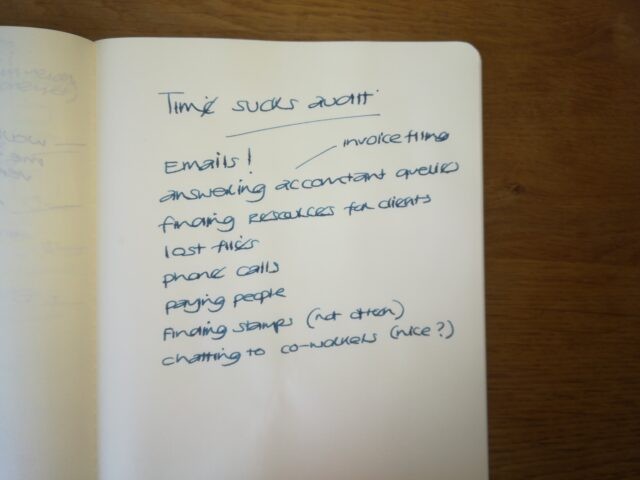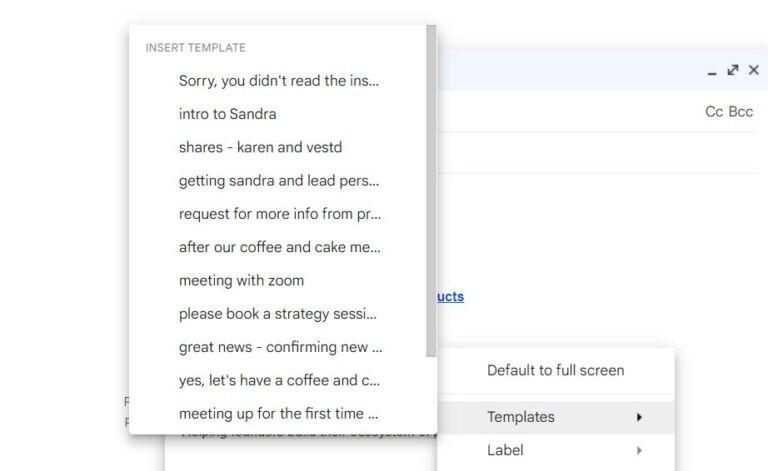How to do a time audit

You need to do a time audit when you’re busy. When you’re running a small business, you’re super busy, yes? We all are. Therefore, there’s even more reason to do a time audit.
You don’t want to be so very busy. Being busy doesn’t make you effective. Especially if you, like most small business owners, are constantly doing things that do not push the levers of profit for you. We must protect your time and energy to focus on the tasks within your Zone of Genius.
I’d love it if you could spend more time doing things you enjoy rather than grinding away at the boring stuff.
Over the years, I’ve developed a unique way on how to do a time audit. This version of a time audit is specially developed to identify the areas that suck up your time. Everyone I’ve got to do this time audit with has had some surprises revealed. And in the second stage of the time audit, we can work on ways to get rid of these pesky time sucks.
The time sucks audit
The time sucks audit is a way to get to grips with all the tasks that suck up your time and find a way to get them off your to-do list. Then, you can get stuck into those other tasks. The ones that will make a big difference to your business and your clients. And the ones where you’ll be bouncing out of bed in the morning cos you know that you’re working on the interesting, fun stuff today.
How to do a time audit
Make a list of all the things you do in the week. Just jot them down on a piece of paper or record them on your phone.
If you want to get super into this and get even more value from it, record your days for a week using Toggl or another time-tracking software to get a more objective view of how you’re spending your time. Using Toggl does give you superior results but is best suited to people who enjoy using apps.
Don’t try to second guess what you’re recording, but do take a moment to notice how you feel about what you’re doing.
- Are you relaxed and enjoying it?
- Are you clock-watching and waiting for this meeting/activity/time to end so you can move on to something else
- Have you chosen this activity for yourself – did you put it on your list, and why?
- What else is happening while you’re doing it?
- Are you being drawn into multitasking, constantly checking your email, or reading online? Or are you absorbed?
- What does the nature of time feel like while you’re doing this?
This last one sounds crazy, but bear with me…
A brief diversion into the nature of time
I’ve always thought about time as something that flows at a consistent rate, and our lives follow it. Maybe we are all boats on a river of time, ending up dispersed on the ocean.

Apparently, this is nonsense when you get down to physics and maths* and even more so when we get to psychology. Yet another idea I’ve had to disabuse myself of.
I’ve been reading Oliver Burkeman’s excellent book Four Thousand Weeks – Time Management for Mortals. Burkeman’s book was recommended to me by someone who said they’d read it and then didn’t need to read anything else on time management. If you pair it with Graham Allcott’s more practical Productivity Ninja, then these two are, indeed, all that you need.
One of the key elements of Burkeman’s book is the idea that the nature of time changes according to what we’re doing during that time. We’ve all experienced this. The slowness of our river of time when waiting for a train. And if our train is delayed, the time river reduces speed to an agonising drip.

By seeking to understand how time feels while you’re doing a particular activity, we can cherry-pick the tasks where you are more likely to be in a state of flow and, therefore, super effective. A state of flow, where you forget about the outside world because you’re absorbed in a task, can have different speeds and intensities.
Do remember that some of your most important activities can, in fact, be deeply uncomfortable. Your time audit notes might include phrases such as “hell”, “frustrating”, or “want to kill someone”. When you’re trying to learn a new skill or you have to have a difficult conversation with someone, you are unlikely to be in a beautiful flow state. The purpose of our time audit is not to remove our uncomfortable moments. But to remove the ones that are uncomfortable and unproductive.
You may end up still having to have that sales meeting or the discussion with a team member who has made a mistake. But maybe we can ditch the tasks where your frustration comes from having to do a task that someone else could do instead. Or that doesn’t need doing.
Back to our time audit
Once you’ve been through your initial time audit for a week, you’ll have a Toggl log or a list of different tasks with some notes. Then, we can start to divide these up.

Some will fit with your Zone of Genius, and you’ll instantly want to grab these tasks for yourself. In fact, I’ve had clients where I’ve suggested that they delegate particular actions. And they’ve got upset about the thought of someone else doing this. Be mindful of your feelings here, though. Sometimes, this can come from a lack of trust in others rather than recognising that this is genuinely something that you should do yourself.
What usually jumps straight out at you is a whole bunch of tasks that you did because they just needed doing. Answering emails, sorting out some nonsense with the accountant, digging something out for a client. These all clog up your day without making your life or business more wonderful.
Our time sucks choices
At this point, we have a few choices as to what to do with our time sucks.
Start moaning
You could become more moany and whinge about all the useless crap you have to deal with. Poor you. Not recommended, but I can see why someone would be tempted. The moaning response often comes from clients when we do this exercise. And, of course, I’ve done the exact same thing myself when I’ve done my time audits. Poor me.
We moan precisely because the time audit results reveal our less-than-optimal situation in all its horrible details.
Best to get the moaning out, preferably in a supportive and constructive conversation with a fantastic business mentor.
Say no and stop doing it
I do my own time audit every year, and every single time I see tasks which are just not that important. I’ve spent my valuable time on internet rabbit holes, such as researching NASA’s flights around the world. And to test whether time goes slower when you’re in a higher orbit around the world**. Or I’ve wasted time rewriting an article I’ve already started because I filed the original incorrectly and called it something odd.
In 4000 Weeks, Oliver Burkeman points out that we all make choices about how we use our time. Right now, I’m choosing to write this article rather than one of the many other items on my to-do list. And I’m actively choosing to write this for you rather than go further into an internet research rabbit hole about Einstein’s theories of time dilation.
Sure, we all have tasks on our list that are someone else’s choice, or we’re obliged to do them. As business owners, our big advantage should be that we have more choices than people with “regular” jobs. You’re the boss, whether you’re running a team of 50 people or the business is just you, the cat and a laptop.

Every time I audit my own time or go through this exercise with a client, there are tasks where we can just put a red pen through that and not bother to do it. Just say no. And keep saying no.
Stick to your own agenda
The more sophisticated version of this is to say no to the many things we feel obliged to do for others but are not a priority for us. In his book Deep Work, Cal Newport talks about the email he uses when someone asks him to do something that isn’t on his own agenda. This is particularly useful when people ask for a “quick meeting” or to “pick your brains”. He’ll email back to suggest that the person tell him more about what they want to talk about and suggest that he can help by email instead. He also has a standard email to say that he can’t do X, Y or Z that they suggest. A template for a polite way to say “no”.
You might want to spend an hour making email templates for the emails you most commonly send. I have a whole bunch of these set up in Gmail. I usually add a few personal details on top. But this “hack” means I get rid of a bunch of time sucks, and I can be nice to people at the same time. After I’d invested some time in creating my own email templates, answering emails took up less space in my next time audit.

Do the things you want to do but ration yourself
We don’t know which of our many tasks will pull the levers of profit. We need to be able to explore new activities and opportunities, just in case these work out for us. Otherwise, we humans would have never emerged from our caves.
Out of the blue, I got an email asking me to appear on an episode of Radio 4’s You and Yours programme. I had no idea if this was going to be a useful activity or a complete time suck. Six million people listen to the show each week, so I did the interview. It sucked up a couple of hours of my time and quite a lot of my mental energy. We’ll see how much it helps my business.
After recording the radio interview and being in the ears of millions of listeners in the UK, I was a bit stressed. So I ate a Tunnock’s caramel wafer. You can do some of the activities your time audit categorises as less than optimal because you enjoy them. Or when you feel an overwhelming urge to do them, go ahead. As long as you ration yourself. Precisely the same as I managed to ration myself to just one deliciously chocolatey biscuit.

Delegating from your time audit
You may already have people in your team to delegate some of your time-suck activities. When I’m mentoring a client who already has a team but also has a massive list of time sucks coming up in their time management audit, I ask them why they’re not delegating these activities.
Sometimes, clients say they’re paying staff to do client work, and they want to maximise the billable hours per employee. This is a good answer. But it leaves the question of why the founder of the business is left with all the time-sucks. Why are you mopping up? Why are you being a sponge?
It is entirely okay for you to delegate non-client tasks to other team members, even if they are billable. Or to share out the time sucks amongst the staff.
Start delegating with a virtual assistant
If you don’t have other people in the business, it’s time to start bringing people in to help. An excellent way to get started is to book some hours with a virtual assistant to take the pressure off you.
Delegating to a VA is a low-hassle, low-risk way to get rid of the activities your time audit indicates you are not the best person to do. I often delegate tasks that I could do to Amanda, my virtual assistant, in the knowledge that she will be faster and more thorough than I ever would.
When the time audit says it’s all client work and no fun
If your time is being used up in client work, it’s time to think through alternative ways of working with clients. You might be overservicing clients. One way out of this is to re-engineer how you work as a productised service. Part of productising your service includes becoming super efficient in how you work and cutting out all the little extras you end up including. Especially the tasks you put in to keep the work interesting or to please a client when they don’t notice how you’ve gone the extra mile for them.
Get your Mission Guide to Productised Services
Tweak your time
My latest time sucks audit included finding invoices to give to my accountant so he can work out the VAT return. Often, these are invoices for pretty small amounts of money, so it’s not pushing my levers of profit by more than a few quid. I made a rule for myself that I wouldn’t do this anymore. This kind of task stresses me out because it has to be done for the quarterly VAT return, but it gets in the way of being able to work on more exciting jobs, such as writing blogs.
Instead, I made a rule that as soon as I received an invoice or payment confirmation, I would download the invoice into a Dropbox folder I shared with the accountant. Now, he doesn’t have to talk to me, which I suspect he prefers.
And I’m sure you’ll have some tasks that you can make a rule never to do again. Which means you’re much more likely to live happily ever after.
What does the time audit reveal about your company’s future?
I spend a good part of my life with my business mentoring clients and talking about how they spend their time. That’s where the time audit methodology comes from. I get almost every mentoring client to do this exercise.
What I find is that many clients are keen to get rid of many of the time sucks. They’re already aware of the tasks that suck up their time that they don’t want to do. But most people are in the moaning stage. Giving up doing these tasks is a real test of a founder. Because you have to put effort (and often money) into changing your habits, delegating or refusing some of these.
The people I work with who immediately go out and find someone to do the tasks that should not be on the founder’s to-do list or who are happy to put social media (classic time suck!) on hold are the ones. They are the people who immediately get into tackling the big things that need doing to move the business forward.
James’ story
I mentored James recently, who already had a team of six staff. When we did the time sucks audit, he was very emotional and opened up to me about how each year he suffered from Seasonal Affective Disorder depression during the winter. And how he knew he should take a holiday somewhere sunny in January. But couldn’t because he was being a classic manager sponge and doing everything to make the team members’ lives easier.

not actually James
Once we opened up the possibility of James going away and working from Tenerife or India for six weeks in January and February, there was no stopping him. I shared how another of my business mentoring clients regularly did this. She goes to India twice a year, works for 2 hours in the morning and then another two hours between 4 and 6pm. This leaves her free to enjoy day trips and to go out in the evening.
James heard this true story and jumped on it. Within a month, he was interviewing for an office manager to do all the project planning and finances. And he’d brought in a freelancer to create all the images for social media.
“What can I get rid of next, Julia?” he asked. So, we made another list.
A different mindset
When I work with someone like James, I can tell that his business is going to jump up in the next six months. Because he’s investing in the foundations.
I worry more about the people I have to constantly try to persuade to focus on the actions that will make their business grow. They are holding onto old thinking that will prevent them from realising their ambitions. This thinking comes from the ego. They believe they are the only ones able to do things well and don’t trust others to help.
In my experience mentoring hundreds of companies, I have seen that founders like James will be able to move forward. And they will have lower stress levels, have more interesting activities outside work and travel more.
Which type of founder do you want to be?
Next steps – actually do your time audit
I need you to stop reading this blog now and go and open a blank page in your notebook. Go through your to-do list and your diary. Think back to last week. Write down all the tasks you did, the meetings you had and where you spent your time. Do this for the next 5 working days.
And then work out which ones you’re going to dump, delegate or do in moderation. Be ruthless. And then do the time sucks audit again in six months to see what the difference is. I do mine every year now.
You might also want to do the times sucks audit in conjunction with thinking about your Zone of Genius. The Zone of Genius is the array of tasks where you are genuinely the best person to do these tasks, you love doing them, and they’re making a big impact on your company.
Other great business stories
Every week, I send out a story like this by email. They’re all based on true stories, tips and ideas from what I’ve been learning from clients and running my own business. Lots of great ideas you can apply to your own business.
And some more stories from the blog
Weaning yourself off over servicing your clients
How to use a virtual assistant
Could your business use some radical delegation?
How to immediately free up (some of) your time
* Einstein makes all of this much more complicated by doing the maths to show that time flows differently depending on where you are in the universe and how fast you are travelling.
**Here’s a succinct version of how travelling around the planet makes time go slower, but be careful you don’t fall into my time suck rabbit hole.
